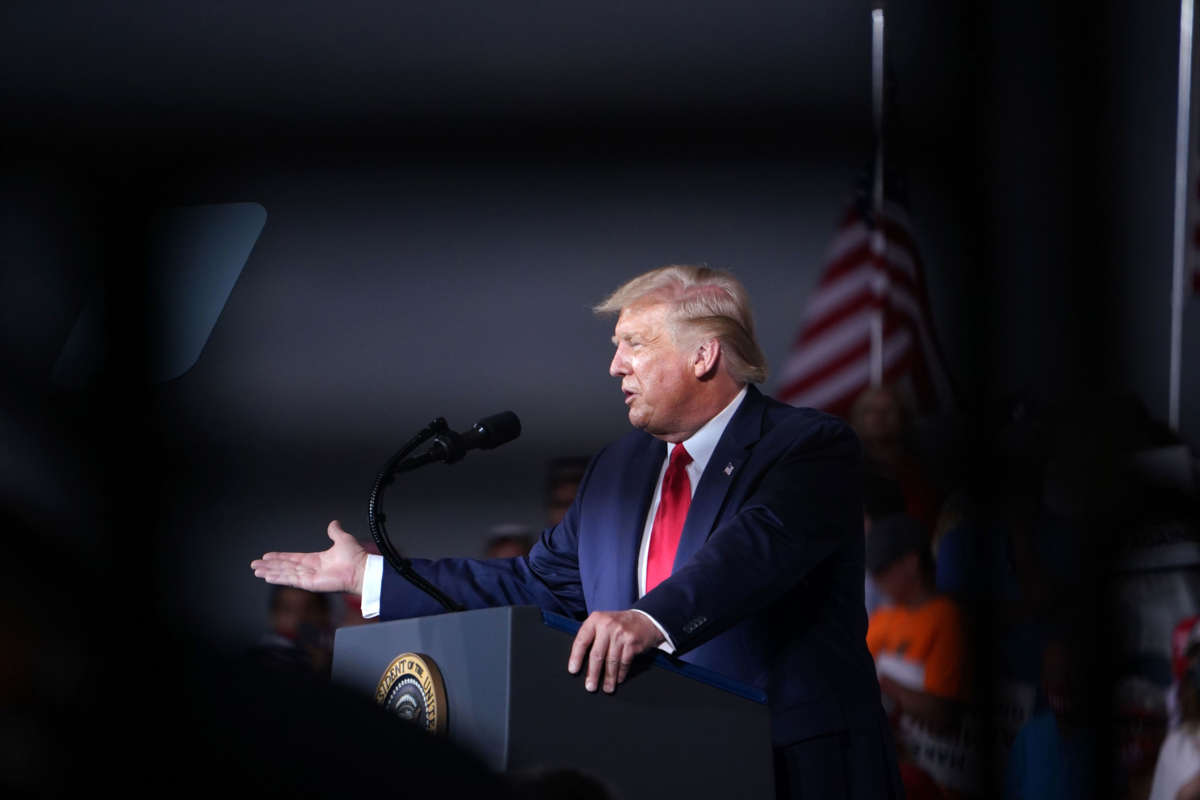Honest, paywall-free news is rare. Please support our boldly independent journalism with a donation of any size.
President Trump was well aware of how dangerous COVID-19 was in the early days of the pandemic. He even admitted to journalist Bob Woodward in February that he understood the disease was deadlier than the flu, contradicting his public statements and attitudes toward the disease during that time and in the months following.
Excerpts and audio recordings of Woodward’s conversations with Trump, set to be included in the veteran journalist’s upcoming book about the Trump administration entitled Rage, were made public on Wednesday, showcasing Trump’s detailed knowledge about COVID-19 prior to it becoming more widespread among the U.S. populace. But while Trump seemed to understand how deadly the disease might become, he also told Woodward he preferred not to be candid with the American people about it.
Coronavirus is “more deadly than your — you know, your, even your strenuous flus,” Trump said on February 7 to Woodward. “You know, people don’t realize, we lose 25,000, 30,000 people a year here. Who would ever think that, right?”
“This is more deadly,” Trump added.
That statement contradicts the many times the president has suggested otherwise. Later in February, for instance, Trump said coronavirus would disappear “like a miracle,” and called criticisms of his preparations for the disease a new political “hoax” against him. On March 9, despite what he told Woodward in private, he misleadingly compared COVID-19 to the flu, suggesting on Twitter that calls to close the economy in order to deal with the coronavirus were overblown reactions to the pandemic, as tens of thousands of Americans die annually from influenza.
“At this moment there are 546 confirmed cases of CoronaVirus, with 22 deaths. Think about that!” Trump said at the time.
As of Wednesday, more than 194,000 Americans have died from coronavirus, with some health models projecting as many as 314,000 deaths from the disease by December 1.
Trump also told Woodward he was warned in late January about the gravity of the situation, having been briefed by National Security Adviser Robert O’Brien about the potential deadliness coronavirus posed to the United States.
“This will be the biggest national security threat you face in your presidency,” O’Brien had said to Trump. “This is going to be the roughest thing you face.”
In later interviews that took place in mid-March, Trump explained to Woodward his rationale for not informing Americans about the true implications of the disease.
“I wanted to always play it down. I still like playing it down, because I don’t want to create a panic,” Trump said.
But the president’s refusal to take the disease head on came with severe consequences. According to one study from a pair of epidemiologists in mid-April, for example, had Trump implemented or encouraged stay-at-home orders just two weeks earlier than when they came about on March 16, 90 percent of all coronavirus deaths in the U.S. up to that point could have been avoided.
Instead, just days after speaking with Woodward in March, Trump was advocating for states to suspend their stay-at-home orders, even though the White House’s own “15 Days to Slow the Spread” guidelines were barely into their first week. “WE CANNOT LET THE CURE BE WORSE THAN THE PROBLEM ITSELF,” Trump tweeted in all capital letters on March 22.
The following day, he began advocating for states to restart their economies in public statements. “Our country wasn’t built to be shut down,” Trump said on March 23.
Woodward’s book Rage will not only touch upon Trump’s response to coronavirus, it will also delve into other matters Trump has failed to adequately address during his presidency, including race relations. In one telling exchange, the journalist asked Trump if it was important to recognize white privilege in American society, and whether he had a responsibility as president to “understand the anger and the pain” being expressed by Black Americans.
“No. You really drank the Kool-Aid, didn’t you? Just listen to you,” Trump responded to Woodward. “Wow. No, I don’t feel that at all.”
Trump’s comments on race to Woodward occurred on June 19 of this year, or “Juneteenth,” a day that recognizes the freeing of the last enslaved Black Americans in the Confederacy after the Civil War.
Media that fights fascism
Truthout is funded almost entirely by readers — that’s why we can speak truth to power and cut against the mainstream narrative. But independent journalists at Truthout face mounting political repression under Trump.
We rely on your support to survive McCarthyist censorship. Please make a tax-deductible one-time or monthly donation.
